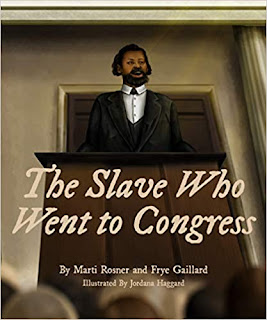Frye Gaillard is the author, with Marti Rosner, of the new children's picture book biography The Slave Who Went to Congress. His many other books include A Hard Rain: America in the 1960s, Our Decade of Hope, Possibility, and Innocence Lost. He is the writer-in-residence at the University of South Alabama, and he lives in Mobile, Alabama.
Q: Why did you and Marti Rosner decide to write a book about
Congressman Benjamin Sterling Turner (1825-1894), and why did you write the book in his
voice?
A: Marti and I discovered the story of Benjamin Sterling
Turner when I was researching another book, Cradle of Freedom, about the civil
rights movement in Alabama. I was in Selma, Turner's hometown, and stumbled
upon his story.
Marti, who has been a good friend since around 1980, was
about to retire from a career in elementary education and wanted to write a
children's book. She introduced me to the subtlety and sophistication of
children's picture books, and we decided to write Turner's story.
In our research, we discovered the speeches he had made as a
member of Congress, as well as other writings, which gave us a sense of his
sensibilities and his voice. We decided that letting him tell his story gave a
greater feeling of immediacy for young readers. We had read other books such as
My Name is James Madison Hemings, which employed a similar device.
Q: How did you research the book, and did you learn anything
that especially surprised you?
A: We researched the book at the Selma Public Library,
which had extensive files on Turner including a brief, but contemporaneous
biography written by a member of his family. We also benefited from the work of
Selma historian Alston Fitts, who had done extensive research on Turner and
made his files available.
Two museums in Selma, the National Voting Rights Museum and
the Old Depot Museum, also had preserved old photographs and flyers advertising
Turner's livery stable business, etc. - which became valued primary sources.
In addition, it so happened that during the Civil War, when
his owner went off to fight for the Confederacy, he left Turner, his literate
slave, in charge of the St. James Hotel, Selma's largest. That hotel was still
in operation when we were researching the book, and is now being renovated to
preserve its beautiful historic character. We stayed there, which gave us an
added feeling for the history.
And we visited the monument at Turner's gravesite,
erected by an interracial group of Selma citizens roughly a century after his
death.
I suppose the thing that surprised us most was the character
of Benjamin Sterling Turner. He was so determined, so resolute, in his pursuit
of literacy, freedom, and equal rights, and yet he possessed a generosity of
spirit that is rare.
He favored the right to vote for former slaves, reparations
in the form of land on which they could build their lives, mixed race schools
in which all children could get an education, but he also opposed punishment
for former Confederates and set out to "bind up the wounds of war."
We thought of Abraham Lincoln's Second Inaugural, "with
malice toward none," and the 20th century examples of Nelson Mandela and
Martin Luther King, and thought this largely forgotten figure from the
difficult years of Reconstruction should be celebrated for his heroic and
farsighted vision.
Q: Your book A Hard Rain addresses the 1960s--why did you
focus on that particular decade, and do you see echoes from the '60s in today's
politics and culture?
A: I came of age in the 1960s. I was in junior high school
when the decade started, and was graduating from college and beginning a career
as a journalist when it ended.
During those years, growing up in the South, I was
captivated by the drama of the civil rights movement, the Vietnam War and the
protests against it, the women's movement, the environmental movement, etc.
I was fascinated not only by the politics of social change,
but cultural happenings as well - the music and literature of the decade, the
space race, dramatic moments in the world of sports like the rise of Muhammad
Ali and the Olympic protests of 1968. It was a dramatic time.
And yes, I do see parallels for today. The great story arcs
of idealism and hope on the one hand, and division and cynicism on the other,
continue to shape the life of our country.
Q: You write, "I hope to offer a sense of how it
felt" to experience the '60s. What impact did the decade have on you
personally?
A: I was forever changed by the decade. I saw people about
my age, and some who were older, act on a leap of faith that our great country
could be made even greater - more inclusive - that our founding ideals could be
made more real. I have never gotten over that leap of faith, and all of the
hope that went along with it.
That hope has been tested in recent years, but I cling to
the notion that it will be vindicated in 2020. We are living, again, in a
watershed time.
Q: What are you working on now?
A: After writing A Hard Rain, which was a massive
undertaking, and then a children's book, which was a new experience, I am not
writing anything right now.
I'm enjoying my work as Writer in Residence at the
University of South Alabama. My duties include not only working with students
at the university, but doing public programs about the issues raised in these
books.
Q: Anything else we should know?
A: I have a website, fryegaillard.com, that you can glance at if you'd like. I
do appreciate your interest.
--Interview with Deborah Kalb



No comments:
Post a Comment